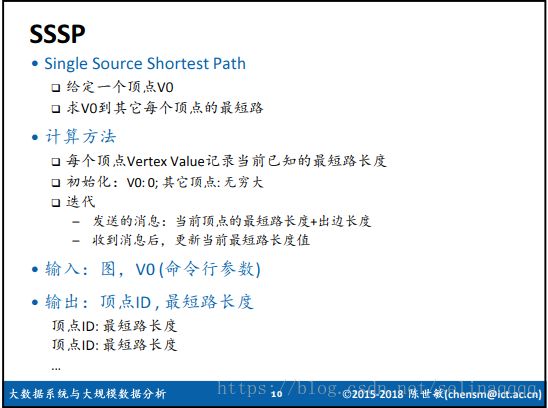- 大数据Hadoop集群运行程序
赵广陆
hadoophadoopbigdatamapreduce
目录1运行自带的MapReduce程序2常见错误1运行自带的MapReduce程序下面我们在Hadoop集群上运行一个MapReduce程序,以帮助读者对分布式计算有个基本印象。在安装Hadoop时,系统给用户提供了一些MapReduce示例程序,其中有一个典型的用于计算圆周率的Java程序包,现在运行该程序。该jar包文件的位置和文件名是“~/hadoop-3.1.0/share/Hadoop/
- 浅析大数据Hadoop之YARN架构
haotian1685
python数据清洗人工智能大数据大数据学习深度学习大数据大数据学习YARNhadoop
1.YARN本质上是资源管理系统。YARN提供了资源管理和资源调度等机制1.1原HadoopMapReduce框架对于业界的大数据存储及分布式处理系统来说,Hadoop是耳熟能详的卓越开源分布式文件存储及处理框架,对于Hadoop框架的介绍在此不再累述,读者可参考Hadoop官方简介。使用和学习过老Hadoop框架(0.20.0及之前版本)的同仁应该很熟悉如下的原MapReduce框架图:1.2H
- Datax ETL工具源码研究
Spring1985
由于公司数据共享交换产品中需要用到数据交换工具,所以对数据交换工具进行了大量的研究,目前比较流行的数据交换工具有Kittle、Sqoop、KafkaConnect、DataX;以下是个人的一点比对结果:如下四款工具除了Kittle其他的共同点都是面向插件方式开发,扩展性都比较好。Kittle优点:与大数据Hadoop结合比较好,功能比较齐全,强大,支持数据库,文件数据读写,界面拖拽方式操作;缺点:
- java大数据hadoop2.9.2 hive操作
crud-boy
java大数据大数据hivehadoop
1、创建常规数据库表(1)创建表createtablet_stu2(idint,namestring,hobbymap)rowformatdelimitedfieldsterminatedby','collectionitemsterminatedby'-'mapkeysterminatedby':';(2)创建文件student.txt1,zhangsan,唱歌:非常喜欢-跳舞:喜欢-游泳:一般
- java大数据hadoop2.9.2 Flume安装&操作
crud-boy
java大数据大数据flume
1、flume安装(1)解压缩tar-xzvfapache-flume-1.9.0-bin.tar.gzrm-rfapache-flume-1.9.0-bin.tar.gzmv./apache-flume-1.9.0-bin//usr/local/flume(2)配置cd/usr/local/flume/confcp./flume-env.sh.template./flume-env.shvifl
- 大数据Hadoop生态圈技术之浅析PageRank计算原理
A尚学堂Nancy老师
一、什么是PageRank?——PageRank是Google提出的算法,用于衡量特定网页相对于搜索引擎索引中的其他网页而言的重要程度。——是Google创始人拉里·佩奇和谢尔盖·布林于1997年创造的——PageRank实现了将链接价值概念作为排名因素。二、计算环境——Hadoop-2.5.2——四台主机——两台NN的HA——两台RM的HA——离线计算框架MapReduce三、计算原理(1)思考
- HDFS执行balance报错:hdfs balance java.io.IOException: Another Balancer is running.. Exiting
不会吐丝的蜘蛛侠。
Hadoophdfshadoopjava
现象:1、大数据Hadoop集群,HDFS扩容后,为了使各节点数据均衡,执行balance操作。2、启动hdfsbalance时,一直出现其他的balance在执行中,其实并没有执行。java.io.IOException:AnotherBalancerisrunning…Exiting…解决方法:网上的思路:①HDFS在运行Balancer的时候,会将运行Balancer的主机名写入到balan
- 大数据Hadoop/Hive学习笔记一(基础概念)
lucky_myj
大数据hadoop
大数据Hadoop/Hive学习笔记一(基础概念)一,概念介绍:大数据:大数据一般用来描述一种数量庞大,复杂的数据集,传统数据处理应用程序难以应对。大数据通常应用于预测分析,用户行为分析或从数据中提取有价值的信息用于高级数据分析方法,并不局限与指某种特定规模的数据集大数据的特征:大数据具有多样性、体量(volume)和价值密度(value)/精准性(veracity)体量Volume:非结构化数据
- java大数据hadoop2.9.2 Linux安装mariadb和hive
crud-boy
java大数据大数据linuxmariadb
一、安装mariadb版本centos71、检查Linux服务器是否已安装mariadbyumlistinstalledmariadb*2、如果安装了,想要卸载yumremovemariadbrm-rf/etc/my.cnfrm-rf/var/lib/mysql才能完全删除3、安装mariadb在线网络安装yuminstall-ymariadb-server开启服务systemctlstartma
- 大数据Hadoop入门——HDFS分布式文件系统基础
nucty
大数据大数据hadoophdfs
HDFS总结在现代的企业环境中,海量数据超过单台物理计算机的存储能力,分布式文件系统应运而生,对数据分区存储于若干物理主机,管理网络中跨多台计算机存储的文件系统。HDFS只是分布式文件管理系统中的一种。HDFS命令基础语法:【hadoopfs具体命令、hdfsdfs具体命令】两个是完全相同的。显示文件列表#hdfsdfs-lsURL创建目录#hdfsdfs-mkdir[-p]URL使用-p参数可以
- java大数据hadoop2.92安装伪分布式文件系统
crud-boy
java大数据大数据java
ApacheHadoop3.3.6–Hadoop:SettingupaSingleNodeCluster.1、解压缩到某个路径/usr/local/hadoop2、修改配置文件/usr/local/hadoop/etc/hadoop/hadoop-env.shexportJAVA_HOME=/usr/local/javajdk3、修改配置文件/usr/local/hadoop/etc/hadoop
- Java大数据hadoop2.9.2搭建伪分布式yarn资源管理器
crud-boy
java大数据java大数据eclipse
1、修改配置文件cd/usr/local/hadoop/etc/hadoopcp./mapred-site.xml.template./mapred-site.xmlvimapred-site.xmlmapreduce.framework.nameyarnviyarn-site.xmlyarn.nodemanager.aux-servicesmapreduce_shuffle2、重新启动hadoo
- java大数据hadoop2.92 Java连接操作
crud-boy
java大数据大数据javahadoop
1、要想Java可以连接自己虚拟机的hadoop文件系统,需要给文件系统权限(1)需要在/usr/local/hadoop/etc/hadoop/core-site.xmlcore-site.xml文件配置具体ipfs.defaultFShdfs://ip:9000(2)文件权限hdfsdfs-chmod-R777/2、maven依赖org.apache.hadoophadoop-common2.
- java大数据hadoop2.9.2 Java编写Hadoop分析平均成绩
crud-boy
java大数据大数据hadoop分布式
1、准备文件,例如score.txt,内容如下:zsk188lsk198wwk178zsk288lsk298wwk278zsk388lsk398wwk3782、创建maven项目org.apache.hadoophadoop-common2.9.2org.apache.hadoophadoop-client${hadoop.version}org.apache.hadoophadoop-hdfs$
- 大数据Hadoop3.0更新,到底改进了哪些新的特性呢
尚学先生
截止到目前,大数据hadoop已经更新到了3.0版本,那么相比较之前的版本,3.0到底在哪些方面做出了新的改变呢?到底做了哪些重大的改进呢?1、HadoopCommon(1)内核的精简,这个是很多次版本更新都会进行重组的地方。想比较与之前的版本,3.0剔除了一些过期的API和实现,将默认组件实现替换成最高效的实现(比如将FileOutputCommitter缺省实现换为v2版本,废除hftp转由w
- 第一章 大数据Hadoop学习笔记(一)
Thanks.
hadoop学习大数据
一、存储单位按顺序给出数据存储单位:bit、Byte、KB、MB、GB、TB、PB、EB、ZB、YB、BB、NB、DB。一般TB、PB、EB为单位的数据为大数据。1Byte=8bit1K=1024Byte1MB=1024K1G=1024M1T=1024G1P=1024T二、大数据主要解决海量数据的采集、存储和分析计算问题。三、大数据特点(4V)Volume(大量)、Velocity(高速)、Var
- 大数据Hadoop入门学习线路图
千_锋小小千
Hadoop是系统学习大数据的必会知识之一,Hadoop里面包括几个组件HDFS、MapReduce和YARN,HDFS是存储数据的地方就像我们电脑的硬盘一样文件都存储在这个上面,MapReduce是对数据进行处理计算的。YARN是一种新的Hadoop资源管理器,可为上层应用提供统一的资源管理和调度,它的引入为集群在利用率、资源统一管理和数据共享等方面带来了巨大好处。如何入门Hadoop学习,不妨
- sqoop的导入命令详解
夜空痕
sqoop的背景sqoop是一个配合大数据hadoop做数据底层的导入导出操作,需要配合hive及分布式文件系统(hdfs或blob)一起使用,在大数据ETL应用领域,sqoop占据主流。sqoop是一个对数据进行导入或者导出的ETL工具,也有其他的同类产品,datax、kettle,但是不管使用什么工具,这都是一种手段,终其究竟,要学的是其中的思想和逻辑。sqoop分为导入操作和导出操作,从关系
- YARN知识点总结
飞有飞言
如果把大数据Hadoop集群当作一台计算机,那么HDFS=磁盘YARN=任务调度器+资源管理器所有任务都是运行在Yarn上Yarn分为两个大的模块:ResourceManagerNodeManagerResourceManager运行在master机器上,用于分配资源两个模块Scheduler负责资源分配ApplicationsManager负责应用管理.RM不负责启动container,而是告诉
- 大数据Hadoop分布式文件系统HDFS的两类节点NameNode和DataNode
A尚学堂Nancy老师
HDFS集群有两类节点,并以管理者-工作者模式运行,即一个NameNode(管理者)和多个DataNode(工作者)。HDFS官方架构图一、NameNode(NN)——基于内存存储:不会和磁盘发生交换·只存在内存中·持久化——NameNode主要功能·接受客户端的读写服务·收集DataNode汇报的Block列表信息——NameNode保存metadata信息包括·文件owership和permi
- 大数据Hadoop集群的启动
赵广陆
hadoophadoopbigdatahdfs
目录1启动准备工作1.1配置操作系统的环境变量1.2创建Hadoop数据目录1.3格式化文件系统1.4启动和关闭Hadoop1.5验证Hadoop是否成功启动1.6hadoop-daemon.sh的使用2HDFS常用的操作命令3hdfs的高级使用命令3.1HDFS文件限额配置3.2数量限额3.3空间大小限额3.4HDFS的管理命令3.5hdfs的安全模式想学习架构师构建流程请跳转:Java架构师系
- 大数据Hadoop技术的发展历史与未来前景
人工智能和大数据时代
大数据Hadoop
大数据概念火了又火,但是好多人对大数据的概念却一知半解,今天主要来细说下Hadoop:1.Hadoop是什么1)Hadoop是一个由Apache基金会所开发的分布式系统基础架构2)主要解决,海量数据的存储和海量数据的分析问题。3)广义上来说,HADOOP通常是指一个更广泛的概念——HADOOP生态圈2.Hadoop发展历史1)Lucene–DougCutting开创的开源软件,用java书写代码,
- Hyper-v虚拟机Hadoop集群搭建
真.电脑人
hadoop大数据分布式
大数据Hadoop简介Hadoop是一个由Apache基金会所开发的分布式系统基础架构。Hadoop实现了一个分布式文件系统(HadoopDistributedFileSystem),简称HDFS。(海量数据存储)HDFS为海量的数据提供了存储,而MapReduce**分布式计算**则为海量的数据提供了计算总结:用Java开发HDFS–解决大数据存储问题MapReduce–解决大数据计算问题HDF
- 【大数据学习笔记-1】大数据hadoop平台基本组件
工匠小能手
相关概念和应用场景大数据
Hadoop是一个由Apache基金会所开发的分布式计算和存储架构。说人话的通俗描述:你在爱奇艺网站看过一次科幻片后,下次再登录爱奇艺,首页会把最新科幻动作片推送给你,目的是要向你多收点会员费。这背后的技术就是叫大数据的技术来自动判断你好什么口味的电影。行业描述:开源的分布式存储和计算框架,广泛用户海量数据的存储和处理,比如淘宝网的商品推送,爱奇艺视频的首页电影推送。Hadoop的主要组件:htt
- 【大数据Hadoop】HDFS-Namenode-format格式化的源码步骤分析
笑起来贼好看
Hadoop大数据服务运维部署hadoop大数据hdfs
Namenodeformat流程格式化命令源码解读初始化操作格式化操作本地写VERSION文件JournalManager的格式化持久化FsImage文件流程根据配置项获取nameserviceId、namenodeId判断配置项dfs.namenode.support.allow.format是否允许格式化,一般生产环境建议配置,防止误操作格式化了已有数据。获取格式化的目录(fsImage和ed
- 大数据Hadoop-HDFS_架构、读写流程
大沙头三马路
BigDateLinux大数据hadoophdfsHCIA
大数据Hadoop-HDFS基本系统架构HDFS架构包含三个部分:NameNode,DataNode,Client。NameNode:NameNode用于存储、生成文件系统的元数据。运行一个实例。DataNode:DataNode用于存储实际的数据,将自己管理的数据块上报给NameNode,运行多个实例。Client:支持业务访问HDFS,从NameNode,DataNode获取数据返回给业务。多
- 大数据Hadoop-HDFS_元数据持久化
大沙头三马路
BigDateLinux大数据hadoophdfslinux
大数据Hadoop-HDFS_元数据持久化(1)在HDFS第一次格式化后,NameNode(即图中的主NameNode)就会生成fsimage和editslog两个文件;(2)备用NameNode(即图中的备NameNode)从主用NameNode上下载FSimage,并从共享存储中读取EditLog;(3)备用NameNode将日志和旧的元数据合并,生成新的元数据FSImage.ckpt;(4)
- 大数据课程结构
张一峰
大数据大数据
1、第一阶段javaSE基础阶段-张一峰2、第二阶段-JavaWeb+数据库阶段-张3、第三阶段-大数据分布式架构-张一峰4、第四阶段-大数据Hadoop实战-张一峰5、第五阶段-大数据spark实战-张一峰6、第六阶段-大数据机器学习实战-张一峰
- 大数据hadoop hdfs 基础环境搭建
gauyeah309
1.需要5个软件,virtualBox,centos,hadoop(),jdk(linux),xshell(远程登录)2.virtualBox新建虚拟机LinuxRedHat64位3.安装centos,硬盘->动态分配,软件选择->基础设施服务器4.设置网络,a).设置宿主机实际联网网卡的共享b).控制面板->网络->网络连接->vitualBoxHostonlyNetwork网卡的ip设置为19
- 大数据Hadoop之——部署hadoop+hive+Mysql环境(Linux)
爱吃面的猫
大数据笔记
目录一、JDK的安装1、安装jdk2、配置Java环境变量3、加载环境变量4、进行校验二、hadoop的集群搭建1、hadoop的下载安装2、配置文件设置2.1.配置hadoop-env.sh2.2.配置core-site.xml2.3.配置hdfs-site.xml2.4.配置yarn-site.xml2.5.配置mapred-site.xml2.6.配置workers(伪分布式不配置)2.7配
- JAVA基础
灵静志远
位运算加载Date字符串池覆盖
一、类的初始化顺序
1 (静态变量,静态代码块)-->(变量,初始化块)--> 构造器
同一括号里的,根据它们在程序中的顺序来决定。上面所述是同一类中。如果是继承的情况,那就在父类到子类交替初始化。
二、String
1 String a = "abc";
JAVA虚拟机首先在字符串池中查找是否已经存在了值为"abc"的对象,根
- keepalived实现redis主从高可用
bylijinnan
redis
方案说明
两台机器(称为A和B),以统一的VIP对外提供服务
1.正常情况下,A和B都启动,B会把A的数据同步过来(B is slave of A)
2.当A挂了后,VIP漂移到B;B的keepalived 通知redis 执行:slaveof no one,由B提供服务
3.当A起来后,VIP不切换,仍在B上面;而A的keepalived 通知redis 执行slaveof B,开始
- java文件操作大全
0624chenhong
java
最近在博客园看到一篇比较全面的文件操作文章,转过来留着。
http://www.cnblogs.com/zhuocheng/archive/2011/12/12/2285290.html
转自http://blog.sina.com.cn/s/blog_4a9f789a0100ik3p.html
一.获得控制台用户输入的信息
&nbs
- android学习任务
不懂事的小屁孩
工作
任务
完成情况 搞清楚带箭头的pupupwindows和不带的使用 已完成 熟练使用pupupwindows和alertdialog,并搞清楚两者的区别 已完成 熟练使用android的线程handler,并敲示例代码 进行中 了解游戏2048的流程,并完成其代码工作 进行中-差几个actionbar 研究一下android的动画效果,写一个实例 已完成 复习fragem
- zoom.js
换个号韩国红果果
oom
它的基于bootstrap 的
https://raw.github.com/twbs/bootstrap/master/js/transition.js transition.js模块引用顺序
<link rel="stylesheet" href="style/zoom.css">
<script src=&q
- 详解Oracle云操作系统Solaris 11.2
蓝儿唯美
Solaris
当Oracle发布Solaris 11时,它将自己的操作系统称为第一个面向云的操作系统。Oracle在发布Solaris 11.2时继续它以云为中心的基调。但是,这些说法没有告诉我们为什么Solaris是配得上云的。幸好,我们不需要等太久。Solaris11.2有4个重要的技术可以在一个有效的云实现中发挥重要作用:OpenStack、内核域、统一存档(UA)和弹性虚拟交换(EVS)。
- spring学习——springmvc(一)
a-john
springMVC
Spring MVC基于模型-视图-控制器(Model-View-Controller,MVC)实现,能够帮助我们构建像Spring框架那样灵活和松耦合的Web应用程序。
1,跟踪Spring MVC的请求
请求的第一站是Spring的DispatcherServlet。与大多数基于Java的Web框架一样,Spring MVC所有的请求都会通过一个前端控制器Servlet。前
- hdu4342 History repeat itself-------多校联合五
aijuans
数论
水题就不多说什么了。
#include<iostream>#include<cstdlib>#include<stdio.h>#define ll __int64using namespace std;int main(){ int t; ll n; scanf("%d",&t); while(t--)
- EJB和javabean的区别
asia007
beanejb
EJB不是一般的JavaBean,EJB是企业级JavaBean,EJB一共分为3种,实体Bean,消息Bean,会话Bean,书写EJB是需要遵循一定的规范的,具体规范你可以参考相关的资料.另外,要运行EJB,你需要相应的EJB容器,比如Weblogic,Jboss等,而JavaBean不需要,只需要安装Tomcat就可以了
1.EJB用于服务端应用开发, 而JavaBeans
- Struts的action和Result总结
百合不是茶
strutsAction配置Result配置
一:Action的配置详解:
下面是一个Struts中一个空的Struts.xml的配置文件
<?xml version="1.0" encoding="UTF-8" ?>
<!DOCTYPE struts PUBLIC
&quo
- 如何带好自已的团队
bijian1013
项目管理团队管理团队
在网上看到博客"
怎么才能让团队成员好好干活"的评论,觉得写的比较好。 原文如下: 我做团队管理有几年了吧,我和你分享一下我认为带好团队的几点:
1.诚信
对团队内成员,无论是技术研究、交流、问题探讨,要尽可能的保持一种诚信的态度,用心去做好,你的团队会感觉得到。 2.努力提
- Java代码混淆工具
sunjing
ProGuard
Open Source Obfuscators
ProGuard
http://java-source.net/open-source/obfuscators/proguardProGuard is a free Java class file shrinker and obfuscator. It can detect and remove unused classes, fields, m
- 【Redis三】基于Redis sentinel的自动failover主从复制
bit1129
redis
在第二篇中使用2.8.17搭建了主从复制,但是它存在Master单点问题,为了解决这个问题,Redis从2.6开始引入sentinel,用于监控和管理Redis的主从复制环境,进行自动failover,即Master挂了后,sentinel自动从从服务器选出一个Master使主从复制集群仍然可以工作,如果Master醒来再次加入集群,只能以从服务器的形式工作。
什么是Sentine
- 使用代理实现Hibernate Dao层自动事务
白糖_
DAOspringAOP框架Hibernate
都说spring利用AOP实现自动事务处理机制非常好,但在只有hibernate这个框架情况下,我们开启session、管理事务就往往很麻烦。
public void save(Object obj){
Session session = this.getSession();
Transaction tran = session.beginTransaction();
try
- maven3实战读书笔记
braveCS
maven3
Maven简介
是什么?
Is a software project management and comprehension tool.项目管理工具
是基于POM概念(工程对象模型)
[设计重复、编码重复、文档重复、构建重复,maven最大化消除了构建的重复]
[与XP:简单、交流与反馈;测试驱动开发、十分钟构建、持续集成、富有信息的工作区]
功能:
- 编程之美-子数组的最大乘积
bylijinnan
编程之美
public class MaxProduct {
/**
* 编程之美 子数组的最大乘积
* 题目: 给定一个长度为N的整数数组,只允许使用乘法,不能用除法,计算任意N-1个数的组合中乘积中最大的一组,并写出算法的时间复杂度。
* 以下程序对应书上两种方法,求得“乘积中最大的一组”的乘积——都是有溢出的可能的。
* 但按题目的意思,是要求得这个子数组,而不
- 读书笔记-2
chengxuyuancsdn
读书笔记
1、反射
2、oracle年-月-日 时-分-秒
3、oracle创建有参、无参函数
4、oracle行转列
5、Struts2拦截器
6、Filter过滤器(web.xml)
1、反射
(1)检查类的结构
在java.lang.reflect包里有3个类Field,Method,Constructor分别用于描述类的域、方法和构造器。
2、oracle年月日时分秒
s
- [求学与房地产]慎重选择IT培训学校
comsci
it
关于培训学校的教学和教师的问题,我们就不讨论了,我主要关心的是这个问题
培训学校的教学楼和宿舍的环境和稳定性问题
我们大家都知道,房子是一个比较昂贵的东西,特别是那种能够当教室的房子...
&nb
- RMAN配置中通道(CHANNEL)相关参数 PARALLELISM 、FILESPERSET的关系
daizj
oraclermanfilespersetPARALLELISM
RMAN配置中通道(CHANNEL)相关参数 PARALLELISM 、FILESPERSET的关系 转
PARALLELISM ---
我们还可以通过parallelism参数来指定同时"自动"创建多少个通道:
RMAN > configure device type disk parallelism 3 ;
表示启动三个通道,可以加快备份恢复的速度。
- 简单排序:冒泡排序
dieslrae
冒泡排序
public void bubbleSort(int[] array){
for(int i=1;i<array.length;i++){
for(int k=0;k<array.length-i;k++){
if(array[k] > array[k+1]){
- 初二上学期难记单词三
dcj3sjt126com
sciet
concert 音乐会
tonight 今晚
famous 有名的;著名的
song 歌曲
thousand 千
accident 事故;灾难
careless 粗心的,大意的
break 折断;断裂;破碎
heart 心(脏)
happen 偶尔发生,碰巧
tourist 旅游者;观光者
science (自然)科学
marry 结婚
subject 题目;
- I.安装Memcahce 1. 安装依赖包libevent Memcache需要安装libevent,所以安装前可能需要执行 Shell代码 收藏代码
dcj3sjt126com
redis
wget http://download.redis.io/redis-stable.tar.gz
tar xvzf redis-stable.tar.gz
cd redis-stable
make
前面3步应该没有问题,主要的问题是执行make的时候,出现了异常。
异常一:
make[2]: cc: Command not found
异常原因:没有安装g
- 并发容器
shuizhaosi888
并发容器
通过并发容器来改善同步容器的性能,同步容器将所有对容器状态的访问都串行化,来实现线程安全,这种方式严重降低并发性,当多个线程访问时,吞吐量严重降低。
并发容器ConcurrentHashMap
替代同步基于散列的Map,通过Lock控制。
&nb
- Spring Security(12)——Remember-Me功能
234390216
Spring SecurityRemember Me记住我
Remember-Me功能
目录
1.1 概述
1.2 基于简单加密token的方法
1.3 基于持久化token的方法
1.4 Remember-Me相关接口和实现
- 位运算
焦志广
位运算
一、位运算符C语言提供了六种位运算符:
& 按位与
| 按位或
^ 按位异或
~ 取反
<< 左移
>> 右移
1. 按位与运算 按位与运算符"&"是双目运算符。其功能是参与运算的两数各对应的二进位相与。只有对应的两个二进位均为1时,结果位才为1 ,否则为0。参与运算的数以补码方式出现。
例如:9&am
- nodejs 数据库连接 mongodb mysql
liguangsong
mongodbmysqlnode数据库连接
1.mysql 连接
package.json中dependencies加入
"mysql":"~2.7.0"
执行 npm install
在config 下创建文件 database.js
- java动态编译
olive6615
javaHotSpotjvm动态编译
在HotSpot虚拟机中,有两个技术是至关重要的,即动态编译(Dynamic compilation)和Profiling。
HotSpot是如何动态编译Javad的bytecode呢?Java bytecode是以解释方式被load到虚拟机的。HotSpot里有一个运行监视器,即Profile Monitor,专门监视
- Storm0.9.5的集群部署配置优化
roadrunners
优化storm.yaml
nimbus结点配置(storm.yaml)信息:
# Licensed to the Apache Software Foundation (ASF) under one
# or more contributor license agreements. See the NOTICE file
# distributed with this work for additional inf
- 101个MySQL 的调节和优化的提示
tomcat_oracle
mysql
1. 拥有足够的物理内存来把整个InnoDB文件加载到内存中——在内存中访问文件时的速度要比在硬盘中访问时快的多。 2. 不惜一切代价避免使用Swap交换分区 – 交换时是从硬盘读取的,它的速度很慢。 3. 使用电池供电的RAM(注:RAM即随机存储器)。 4. 使用高级的RAID(注:Redundant Arrays of Inexpensive Disks,即磁盘阵列
- zoj 3829 Known Notation(贪心)
阿尔萨斯
ZOJ
题目链接:zoj 3829 Known Notation
题目大意:给定一个不完整的后缀表达式,要求有2种不同操作,用尽量少的操作使得表达式完整。
解题思路:贪心,数字的个数要要保证比∗的个数多1,不够的话优先补在开头是最优的。然后遍历一遍字符串,碰到数字+1,碰到∗-1,保证数字的个数大于等1,如果不够减的话,可以和最后面的一个数字交换位置(用栈维护十分方便),因为添加和交换代价都是1
